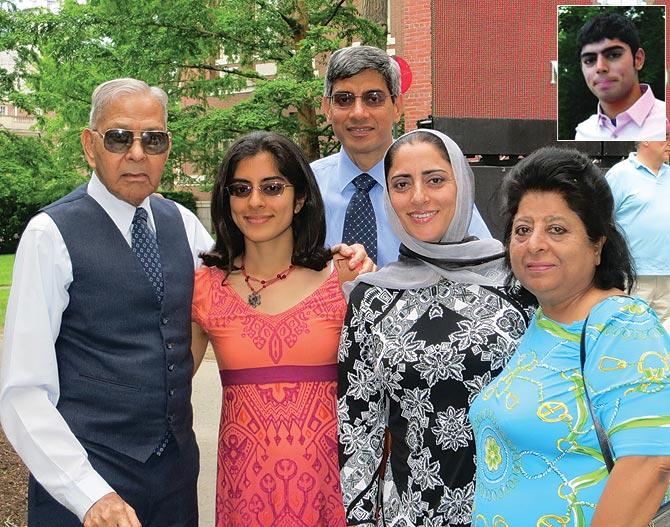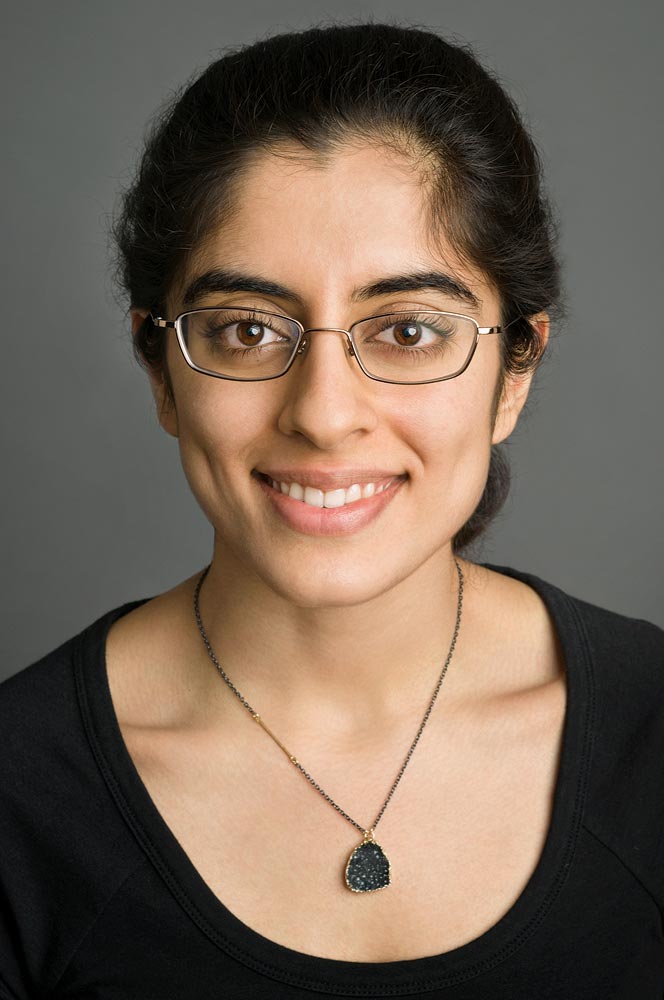Arthur J Pais
Star debater, trailblazing athlete and Harvard medical student.
Sana Raoof learnt from her immigrant family to be the best in whatever she does.
Arthur J Pais finds what inspires this newly minted Soros Fellow
Mujhe peshab karna hai!" two year-old Sana Raoof was screaming for the bathroom.
When her preschool teacher scooped her up, she remembers hearing from her family, she peed on her.
"From then on, we spoke English at home and watched I Love Lucy; by age three, I had Lucy's accent," says Raoof, a Harvard medical student, who is also fluent in Urdu. "It was amazing how quickly my family's immigrant status surfaced in kindergarten: I couldn't say what I got for Christmas or Hanukkah, explain how my parents met (arranged marriage), or wear shorts (we're Muslim) -- I felt different."
Raoof readily acknowledges her identity as a Muslim began developing seriously only a few years ago. "We used to have a Christmas tree in our home," she says. "As children we were not particularly religious. But our mother began inculcating in us the knowledge about Islam."
Since her parents -- her father, a lung doctor and her mother, a radiologist -- were schooled in India, they had never heard of American exams.
They sifted through newspaper education sections to understand. Rana says she received excellent attention from her parents and her paternal grandparents.
'Everyday, Dada (grandfather) would prepare me in public speaking, reading, writing, and arithmetic and the Urdu script,' she wrote in an essay while applying for the Paul and Daisy Soros New American Fellowship. 'He would say, 'even if you are a garbage man, be the greatest in the whole world. He experienced that America, unlike India, recognises the one who has contributed the most, so I had no excuse to not be the best.'
Raoof recalls how her grandfather encouraged her to study words so that she went on to win the regional spelling bee thrice. She practiced pre-calculus with him and could take college level math at age 14.
He took me to libraries and said, "Take the initiative," so I would speak up. In retrospect, Dada's early training was astoundingly defining; I sincerely came to believe that any goal is within my reach, so long as I remained dedicated and genuine,' she added.
Raoof remembers her first debate class in the 9th grade when she fell in love with rhetoric and became more outgoing. She soon served as president of the debate team, founded and taught a philosophy class for two years, and founded a district ‘case review.’
By the state debate, she says, she felt so prepared that she lost sense of being different in any way.
'With competence came a refreshing sense of belonging,' she wrote. 'I won the state debate championships in my junior and senior years, was named the top speaker in New York, and watched my team become the top public school team in the city.'
After studying knot theory at MIT, she won the Intel International Science and Engineering Fair in 2008 and the Taiwan International Science Fair in 2009.
Hoping to teach kids the chemistry of smoking versus running, she created a class, BreatheStrong, in 2010.
She also became Editor-in-Chief of the Harvard Science Review and the youngest keynote speaker for the American Mathematical Society. Her published thesis, which used statistical mechanics to model protein interactions, illuminated the process of antibody optimisation.
Raoof, who grew up on Long Island, recently became one of the 30 students across the country (and one of the four with Indian roots) chosen as a Paul and Daisy Soros Fellowships for New Americans.
Selected from over 1,200 applicants known for academic excellence and community work, each Fellow will receive tuition and stipend assistance of up to $90,000 in support of graduate education in America. The other South Asians are Sundeep Iyer, also from the New York tristate area; Arvan Chhabra and Ramya Parameswaran.
As a Muslim teen, Raoof says she faced a dilemma: she wanted to run track but dress modestly. She qualified for the Junior Nationals four times in the 800 meters and ran varsity track at Harvard College in a boy’s uniform.
Her mother's battle with breast cancer inspired her to enroll in Harvard-MIT's MD/PhD programme. 'When my mother was diagnosed with breast cancer in 2006, my family was brought to its knees,' she wrote in the Soros qualifying essay. 'We prayed for the success of her bilateral mastectomy and chemotherapy; I prayed that she would live to a 105. The hospital where she works was kind enough to pay for her surgery, which was curative.'
Raoof will study resistance mechanisms to targeted therapies for non-small cell lung cancer. Optimistic about tobacco legislation reducing the burden of cancer, she wrote a meta-analysis quantifying second-hand smoke exposure in cars and presented it to the American College of Chest Physicians in 2013.
She also created a class in 2010 to teach high schoolers the biochemistry of smoking versus running. Dozens of schools linked to the American College of Chest Physicians have incorporated the programme into their health classes, and she had taught it personally 52 times so far.
Last year Raoof also attended a World Health Organization Tobacco Conference in which Professor Richard Daynard (Northeastern University Law School) spoke about lung disease in non-smokers due to legislation protecting smokers' liberties over non-smokers' health. 'His convictions resonated with me, so I meet him regularly to brainstorm approaches for near-term legislation. At the Harvard School of Public Health, I authored a meta-analysis on secondhand smoke exposure inside cars, which will soon be submitted for publication to the Journal Chest,' she says. 'I presented this research October 30, 2013 in Chicago at the annual meeting of the American College of Chest Physicians to educate doctors, who educate patients, about the toxicity of smoking in cars with children.'
Raoof adds that she is "privileged that my debate background grants confidence to my presentations and policy writing, and that my physics/computer science research in college gave me a quantitative means of studying cancer biology. Lung cancer's burden on society is tragic, and I feel both humbled and awed by the resources afforded to me to battle the problem with all my strength.”
Her grandfather Abdul Raoof, an orphan in rural India surviving on a government scholarship, had gone on to become chief of UNESCO. Her grandmother Qamar, also an Indian orphan, earned her PhD at Columbia.
Her father studied in Delhi and became chief of pulmonary care at the Brooklyn Methodist Hospital. Her mother became chairperson of radiology at two New York hospitals.
"They are immigrants whose self- esteem stemmed from professional competence and who dreamed of their posterity advancing the American nation that gave them everything,' she says.
Her track coach Richard Rosen, Raoof adds, trained her to push herself to her limits fearlessly and to have faith in the results. "I felt freedom and profound happiness when I sprinted my heart out at practices," she says. "Mr Rosen also taught me an essential lesson for life as a daughter of immigrants: Make it happen. If I wanted to go away to science camp despite my family’s wariness, to race in Manhattan until 2 am, or to wear track shorts despite Muslim modesty, it was my challenge to make my family understand my goals so that they actually encouraged me."
At Harvard College, she notes, suddenly she felt that being a Muslim, Indian-American carried a deeper meaning. "I again felt different. I fasted for Ramadan during collegiate track practice, didn't drink, and was a religious physicist," she offers. "I often found myself at midnight in the courtyard of my dorm, looking at the moon, and thinking of exams, of God, of Dada studying as an orphan 70 years ago. It was a very testing period. Just as my parents reacted to immigration, I too sought respect through achievement."
...
'I admire the way Sana makes time for family despite her studies'
Image: Sana RaoofArthur J Pais
Sana Raoof could have pursued pure mathematics, even English literature, but her first big love was medicine.
"We will not say we did not influence her decision," her father, Suhail Raoof, a lung specialist, says. 'But by and large she decided to study what she wanted the most."
At the dinner table, Dr Raoof adds patient care and medicine was always on the menu, since his wife is also a doctor. Both migrated from India and have lived in New York for nearly two decades.
"Sana would listen intensely to the discussions," he adds. "She also visited us in our offices and had started showing empathy from a very young age."
A crisis in the family when her mother was detected with an early cancer threat further emboldened Sana's decision to follow her parents' career path. Her brother Sahir is majoring in economics at Columbia University.
"I admire the way Sana makes time for family despite her heavy load of studies," their father adds. "She takes on just a few tasks but she will make sure she will excel in them."
He has learned quite a few things from his first-born. "She cares for the community and cares deeply for her family," he says. "Once she organised a surprise birthday party for her brother, took the bus from Boston to attend it and went back the same night by bus."
Sana Raoof took a lot of courses as an undergraduate that gave her deep insights into religion, art and architecture.
"We have travelled a lot with her," Dr Raoof continues. "We were pleasantly surprised to find out how much she knew of architecture or paintings in a European country. But she also has a good knowledge of Indian culture. And a lot of this broadening of the knowledge has to do with my parents because they are excellent educators and education has been a big passion with them."
Their mother Sabiha told the children that it was important for everyone to have a good knowledge of religion and practice it. "She is quite knowledgeable about other religions," Dr Raoof says. "But Islam is our legacy, our heritage and it is a living religion to us."



Comment
article